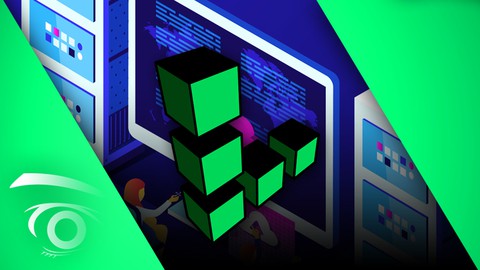
Linode: Build a Scalable Blog App using PHP & MySQL DB
Linode: Build a Scalable Blog App using PHP & MySQL DB, available at $49.99, has an average rating of 4.7, with 111 lectures, based on 84 reviews, and has 23726 subscribers.
You will learn about Understanding the fundamental concepts of cloud computing and the benefits it provides, such as scalability, flexibility, and cost savings. Knowledge of different cloud service models such as IaaS, PaaS, and SaaS. Ability to set up and deploy virtual servers on Linode cloud platform and configure web servers and databases. Understanding of Linux operating system basics, including file systems, command-line tools, and user management. Ability to install and configure the LAMP stack (Linux, Apache, MySQL, and PHP) on Linode server. Knowledge of server security measures such as firewalls, SSH access, and SSL certificates. Familiarity with server scaling techniques such as adding resources like CPU, RAM, and storage. Knowledge of load balancing and auto-scaling concepts to ensure high availability and scalability of cloud-based applications. Understanding of PHP programming language and its syntax, data types, and control structures. Ability to write and execute PHP scripts. Understanding of database management concepts such as creating tables, inserting data, and running queries using MySQL. Ability to design and develop web applications that require user authentication and enable users to create and edit blog posts. Knowledge of best practices for securing web servers and databases. Experience in deploying, maintaining, and managing cloud-based applications. Ability to create and restore server images and backups. This course is ideal for individuals who are IT professionals who want to expand their knowledge of cloud computing and server deployment. or Web developers who want to learn how to deploy web applications on the cloud using Linode. or Entrepreneurs and small business owners who want to learn how to manage and maintain their own cloud-based applications. or Students pursuing a degree in computer science, information technology, or related fields. or Anyone interested in learning more about cloud computing and server deployment, regardless of their technical background. It is particularly useful for IT professionals who want to expand their knowledge of cloud computing and server deployment. or Web developers who want to learn how to deploy web applications on the cloud using Linode. or Entrepreneurs and small business owners who want to learn how to manage and maintain their own cloud-based applications. or Students pursuing a degree in computer science, information technology, or related fields. or Anyone interested in learning more about cloud computing and server deployment, regardless of their technical background.
Enroll now: Linode: Build a Scalable Blog App using PHP & MySQL DB
Summary
Title: Linode: Build a Scalable Blog App using PHP & MySQL DB
Price: $49.99
Average Rating: 4.7
Number of Lectures: 111
Number of Published Lectures: 111
Number of Curriculum Items: 111
Number of Published Curriculum Objects: 111
Original Price: $199.99
Quality Status: approved
Status: Live
What You Will Learn
- Understanding the fundamental concepts of cloud computing and the benefits it provides, such as scalability, flexibility, and cost savings.
- Knowledge of different cloud service models such as IaaS, PaaS, and SaaS.
- Ability to set up and deploy virtual servers on Linode cloud platform and configure web servers and databases.
- Understanding of Linux operating system basics, including file systems, command-line tools, and user management.
- Ability to install and configure the LAMP stack (Linux, Apache, MySQL, and PHP) on Linode server.
- Knowledge of server security measures such as firewalls, SSH access, and SSL certificates.
- Familiarity with server scaling techniques such as adding resources like CPU, RAM, and storage.
- Knowledge of load balancing and auto-scaling concepts to ensure high availability and scalability of cloud-based applications.
- Understanding of PHP programming language and its syntax, data types, and control structures.
- Ability to write and execute PHP scripts.
- Understanding of database management concepts such as creating tables, inserting data, and running queries using MySQL.
- Ability to design and develop web applications that require user authentication and enable users to create and edit blog posts.
- Knowledge of best practices for securing web servers and databases.
- Experience in deploying, maintaining, and managing cloud-based applications.
- Ability to create and restore server images and backups.
Who Should Attend
- IT professionals who want to expand their knowledge of cloud computing and server deployment.
- Web developers who want to learn how to deploy web applications on the cloud using Linode.
- Entrepreneurs and small business owners who want to learn how to manage and maintain their own cloud-based applications.
- Students pursuing a degree in computer science, information technology, or related fields.
- Anyone interested in learning more about cloud computing and server deployment, regardless of their technical background.
Target Audiences
- IT professionals who want to expand their knowledge of cloud computing and server deployment.
- Web developers who want to learn how to deploy web applications on the cloud using Linode.
- Entrepreneurs and small business owners who want to learn how to manage and maintain their own cloud-based applications.
- Students pursuing a degree in computer science, information technology, or related fields.
- Anyone interested in learning more about cloud computing and server deployment, regardless of their technical background.
This course is designed to provide students with a comprehensive understanding of cloud computing and server deployment using Linode. The course starts by introducing students to cloud computing foundations and service models. Students will gain an understanding of cloud computing technologies, including virtualization, containers, and microservices. They will also learn about the benefits of cloud computing, including scalability, flexibility, and cost savings.
Next, the course will delve into cloud server deployment on Linode. Students learn to set up a Linode account and deploy a virtual server in the cloud. Students gain practical experience by deploying Linux servers and configuring various services, such as web servers and databases. Students also learn about Linux foundations, including command-line tools, file systems, and user management.
After understanding the basics of cloud computing and server deployment, the course will introduce students to web server and database foundations. They will learn several web server technologies such as Apache and Nginx, and database technologies such as MySQL, MariaDB and MongoDB. Students also learn about LAMP stack, which includes Linux, Apache, MySQL/MariaDB, and PHP. Students gain practical experience by installing and configuring LAMP stack on their Linode server.
The course then covers the foundations of server security. Students learn to secure their Linode server by configuring firewalls, securing SSH access, and using SSL certificates. They also learn about best practices for securing web servers and databases.
Once students have gained a strong understanding of server deployment and security, the course covers server scaling. Here, students learn how to scale their Linode server by adding resources such as CPU, RAM, and storage. Students also learn about load balancing and auto-scaling, which are important concepts for ensuring high availability and scalability of cloud-based applications.
The course then dives into server images and backups. Students learn how to create and restore server images, which are useful for deploying pre-configured servers quickly. They will also learn about backup strategies and best practices for ensuring data reliability.
The next topic covered in the course is PHP foundations. Students learn about the PHP programming language, including syntax, data types, and control structures. They also gain practical experience by writing and executing PHP scripts.
Finally, the course will culminate with students building a members-only blog using PHP and MySQL. Students will apply the knowledge they have gained throughout the course by creating a web application that requires user authentication and allows users to create and edit blog posts. They will also learn about best practices for designing and developing web applications.
This course is designed to provide students with a comprehensive understanding of cloud computing, server deployment, and web application development. Students will gain practical experience by deploying virtual servers in the cloud, configuring web servers and databases, and building web applications using PHP and MySQL. By the end of the course, students will have the skills and knowledge necessary to deploy and maintain cloud-based applications with confidence.
Course Curriculum
Chapter 1: Introduction to Cloud Computing
Lecture 1: History of Linode
Lecture 2: Intro to Cloud Computing
Lecture 3: Benefits of Cloud Computing
Lecture 4: Cloud Computing Service Models
Chapter 2: Cloud Computing Service Models
Lecture 1: Infrastructure as a Service (IaaS)
Lecture 2: Platform as a Service (PaaS)
Lecture 3: Software as a Service (SaaS)
Lecture 4: IaaS vs PaaS vs SaaS
Chapter 3: Cloud Server Deployment on Linode
Lecture 1: Linode Account Setup
Lecture 2: Exploring the Linode Cloud Manager
Lecture 3: Enabling TFA on Linode
Lecture 4: Deploying a Linode Virtual Instance
Lecture 5: Exploring the Linode Instance Dashboard
Lecture 6: Remote Server Admin via SSH
Lecture 7: Password vs SSH Key Authentication
Lecture 8: SSH Key Pair Authentication on Windows
Lecture 9: SSH Key Pair Authentication on MacOS
Lecture 10: Connecting with LISH
Lecture 11: Adding SSH Public Keys to Linode
Chapter 4: Linux Foundations
Lecture 1: Introduction to Linux
Lecture 2: The Linux Filesystem
Lecture 3: Linux Maintenance Commands
Lecture 4: Linux Directory Commands [Part 1]
Lecture 5: Linux Directory Commands [Part 2]
Lecture 6: Ubuntu Basic Server Configuration
Lecture 7: Introduction to User Accounts
Lecture 8: Creating a Non-Root Account
Lecture 9: Securing the New User Account
Lecture 10: Disabling Root User Access and Password Authentication
Chapter 5: Web Server and Database Foundations
Lecture 1: Introduction to Web Servers
Lecture 2: Self Hosting vs Hosting Provider
Lecture 3: Web Server Software (NGINX vs Apache)
Lecture 4: Introduction to Databases
Lecture 5: SQL vs NoSQL Databases
Lecture 6: Database Transaction Standards (ACID vs CAP)
Lecture 7: CAP Theorem for NoSQL Databases
Lecture 8: Characteristics of SQL vs NoSQL DBMSes
Lecture 9: Key Terms: Stacks, Frameworks, & Languages [Part 1]
Lecture 10: Key Terms: Stacks, Frameworks, & Languages [Part 2]
Lecture 11: Key Terms: Stacks, Frameworks, & Languages [Part 3]
Chapter 6: LAMP Stack Installation and Configuration
Lecture 1: Installing LAMP Stack on Ubuntu via Command Line
Lecture 2: Installing LAMP Stack using Linode Marketplace
Lecture 3: Testing PHP on Apache
Lecture 4: Testing MariaDB Connection from PHP [Part 1]
Lecture 5: Testing MariaDB Connection from PHP [Part 2]
Lecture 6: Remote Server Administration using Linode GLISH
Chapter 7: Foundations of Server Security
Lecture 1: Introduction to Server Security
Lecture 2: Introduction to Firewalls
Lecture 3: Network Firewalls
Lecture 4: Securing SSH with a Network Firewall
Lecture 5: Strict Network Firewall Policy
Lecture 6: Hosted Software Firewalls UFW
Chapter 8: Server Scaling
Lecture 1: Introduction to Scaling
Lecture 2: Vertical Scaling
Lecture 3: Horizontal Scaling with Auto Load Balancers (NodeBalancer)
Lecture 4: Instance IP Swaps
Chapter 9: Server Images and Backups
Lecture 1: Introduction to Images and Backups
Lecture 2: Creating a Custom Image
Lecture 3: Linode Backup Service
Chapter 10: PHP Foundations
Lecture 1: PHP Introduction
Lecture 2: PHP Preparation
Lecture 3: PHP File Test
Lecture 4: PHP Syntax
Lecture 5: PHP Variables
Lecture 6: PHP Variable Scope
Lecture 7: PHP Global Keyword
Lecture 8: PHP Static Keyword
Lecture 9: PHP Echo vs Print
Lecture 10: PHP Data Types
Lecture 11: PHP Objects
Lecture 12: PHP Strings
Lecture 13: PHP Constants
Lecture 14: PHP Operators
Lecture 15: PHP Conditional Statements
Lecture 16: PHP ElseIf Statement
Lecture 17: PHP Switch Statement
Lecture 18: PHP While Loops
Lecture 19: PHP For Loops
Lecture 20: PHP Functions
Lecture 21: PHP Functions Continued
Lecture 22: PHP Arrays
Lecture 23: PHP Multidimensional Arrays
Lecture 24: PHP Sorting Arrays
Lecture 25: PHP Superglobal Variables
Lecture 26: PHP Forms Introduction
Lecture 27: PHP POST vs GET Basics
Lecture 28: PHP Form Output and Validation
Lecture 29: PHP Form Required Fields
Lecture 30: PHP Validation Continued
Chapter 11: Project: Create a Blog with Authentication (PHP & MySQL)
Instructors
-

YouAccel Training
8+ Million Enrollments, 70k+ Reviews. Register Today.
Rating Distribution
- 1 stars: 1 votes
- 2 stars: 1 votes
- 3 stars: 7 votes
- 4 stars: 21 votes
- 5 stars: 54 votes
Frequently Asked Questions
How long do I have access to the course materials?
You can view and review the lecture materials indefinitely, like an on-demand channel.
Can I take my courses with me wherever I go?
Definitely! If you have an internet connection, courses on Udemy are available on any device at any time. If you don’t have an internet connection, some instructors also let their students download course lectures. That’s up to the instructor though, so make sure you get on their good side!
You may also like
- Digital Marketing Foundation Course
- Google Shopping Ads Digital Marketing Course
- Multi Cloud Infrastructure for beginners
- Master Lead Generation: Grow Subscribers & Sales with Popups
- Complete Copywriting System : write to sell with ease
- Product Positioning Masterclass: Unlock Market Traction
- How to Promote Your Webinar and Get More Attendees?
- Digital Marketing Courses
- Create music with Artificial Intelligence in this new market
- Create CONVERTING UGC Content So Brands Will Pay You More
- Podcast: The top 8 ways to monetize by Podcasting
- TikTok Marketing Mastery: Learn to Grow & Go Viral
- Free Digital Marketing Basics Course in Hindi
- MailChimp Free Mailing Lists: MailChimp Email Marketing
- Automate Digital Marketing & Social Media with Generative AI
- Google Ads MasterClass – All Advanced Features
- Online Course Creator: Create & Sell Online Courses Today!
- Introduction to SEO – Basic Principles of SEO
- Affiliate Marketing For Beginners: Go From Novice To Pro
- Effective Website Planning Made Simple




















